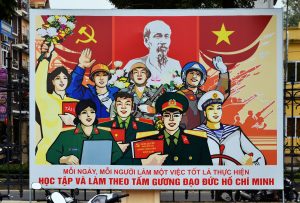Vietnam’s government has proposed cutting off the internet access of those who violate the country’s various cybersecurity laws, the latest in a long string of attempts to tighten its control over the online sphere.
According to a report yesterday in VnExpress, the proposal was included in a recently announced draft decree on the provision and management of internet services and online information produced by the Ministry of Information and Communications.
In the draft, the ministry said it was proposing that internet service providers suspend the service for “organizations and individuals who commit violations online, especially through using livestream services on social media.” Telecoms firms, web storage companies, and data centers would be responsible for refusing or suspending telecom and Internet services, upon the Ministry’s request, the VnExpress report stated.
The draft also includes items regarding the management of users and information online. Among them are previously announced requirements that social media users verify their accounts by using Vietnamese phone numbers and that social media platforms suspend accounts that violate the rules.
The proposed deprivation of internet access is the latest and potentially most far-reaching of a host of initiatives designed to extend the Communist Party of Vietnam’s (CPV)’s control of the information sphere into the digital domain. Unable or unwilling to block these platforms outright, as is the case in China, the government has nonetheless moved, as I argued last month, “to ensure that the agenda of Big Tech conforms to its own.”
The main prong of this effort has been the government’s pressure on social media networks to remove politically sensitive content. In 2018, it passed a cybersecurity law that forces Facebook, Google, and other tech firms to take down posts deemed to be threats to national security within 24 hours of receiving a government request. Most recently, it added a request that social media platforms use artificial intelligence models to automate the detection and removal of scams and politically sensitive online content.
On top of this, the CPV has forced foreign tech firms to establish representative offices in Vietnam and store users’ data locally. It is also preparing new rules that will limit which social media accounts can post news-related content. The government also announced in May that it would be mandatory for users of Facebook, TikTok, and other social media networks to verify their identities.
Not all of this is politically motivated. The authorities have a legitimate concern about the proliferation of online scams and other forms of cybercrime. According to VnExpress, which cited statistics from the Authority of Broadcasting and Electronic Information, Facebook in the first half of the year removed 484 pages advertising gambling services, 72 accounts advertising weapons and explosives, and 2,444 links offering other (unspecified) illegal services.
The problem is that these social ills are often seen as coterminous with various forms of political dissent, ensuring that a safer, cleaner Vietnamese digital sphere will also be significantly more constrained.

































